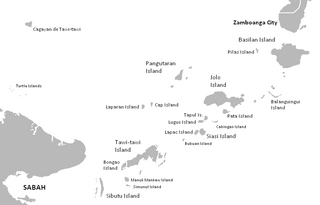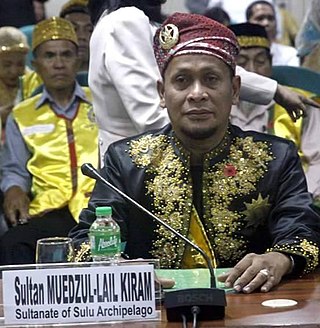
The Sulu Archipelago is a chain of islands in the Pacific Ocean, in the southwestern Philippines. The archipelago forms the northern limit of the Celebes Sea and southern limit of the Sulu Sea. The Sulu Archipelago islands are within the Mindanao island group, consisting of the provinces of Basilan, Sulu, and Tawi-Tawi; hence the archipelago is sometimes referred to as Basulta, derived from the first syllables of the three provinces.

Zamboanga Peninsula is an administrative region in the Philippines, designated as Region IX. It consists of three provinces including four cities and the highly urbanized Zamboanga City. The region was previously known as Western Mindanao before the signing of Executive Order No. 36 of 2001. The city of Zamboanga was designated as the regional center until Pagadian was designated as its new regional center, although Zamboanga City remains the region's cultural, commercial, economic, and educational center.

Sulu, officially the Province of Sulu, is a province of the Philippines in the Sulu Archipelago and part of the Bangsamoro Autonomous Region in Muslim Mindanao (BARMM).

The Autonomous Region in Muslim Mindanao was an autonomous region of the Philippines, located in the Mindanao island group of the Philippines, that consisted of five predominantly Muslim provinces: Basilan, Lanao del Sur, Maguindanao, Sulu, and Tawi-Tawi. It was the only region that had its own government. The region's de facto seat of government was Cotabato City, although this self-governing city was outside its jurisdiction.

The Sultanate of Sulu was a Muslim state that ruled the Sulu Archipelago, coastal areas of Zamboanga City and certain portions of Palawan in the today's Philippines, alongside parts of present-day Sabah, North and East Kalimantan in north-eastern Borneo.

The Tausūg, are an ethnic group of the Philippines and Malaysia. A small population can also be found in the northern part of North Kalimantan, Indonesia. The Tausūg are part of the wider political identity of Muslim Filipinos of western Mindanao, the Sulu archipelago, and southern Palawan, collectively referred to as the Moro people. The Tausugs originally had an independent state known as the Sultanate of Sulu, which once exercised sovereignty over the present day provinces of Basilan, Palawan, Sulu, Tawi-Tawi, Zamboanga City, North Kalimantan and the eastern part of the Malaysian state of Sabah. They are also known in the Malay language as Suluk.

Islam in the Philippines is the second largest religion in the country, and the faith was the first-recorded monotheistic religion in the Philippines. Historically, Islam reached the Philippine archipelago in the 14th century, through contact with Muslim Malay and Arab merchants along Southeast Asian trade networks, in addition to Yemeni missionaries from the tribe of Alawi of Yemen from the Persian Gulf, southern India, and their followers from several sultanates in the wider Malay Archipelago. The first missionaries then followed in the late 14th and early 15th centuries. They facilitated the formation of sultanates and conquests in mainland Mindanao and Sulu. Those who converted to Islam came to be known as the Moros, with Muslim conquest reaching as far as Tondo that was later supplanted by Bruneian Empire vassal-state of Maynila.

Jolo, officially the Municipality of Jolo, is a 1st class municipality and capital of the province of Sulu, Philippines. According to the 2020 census, it has a population of 137,266 people.

Maimbung, officially the Municipality of Maimbung, is a 5th class municipality in the province of Sulu, Philippines. According to the 2020 census, it has a population of 59,597 people.

Butig, officially the Municipality of Butig, is a 6th class municipality in the province of Lanao del Sur, Philippines. According to the 2020 census, it has a population of 22,768 people.

The North Borneo dispute, also known as the Sabah dispute, is the territorial dispute between Malaysia and the Philippines over much of the eastern part of the state of Sabah. Sabah was previously known as North Borneo prior to the formation of the Malaysian federation.
Jamalul ibni Punjungan Kiram III was a former self-proclaimed Sultan of the Sulu Sultanate who claimed to be "the poorest sultan in the world". He was known as an unsuccessful candidate for senator in the Philippine general elections in 2007. In 2013, Kiram III sparked a controversy when he revived a dispute between the Philippines and Malaysia by leading an intrusion into the eastern part of Sabah. His daughter is Princess Jacel Kiram, a proponent of the Sabah claim of the Philippines in 2016.
Sharif ul-Hashim was the regal name of Sharif Abubakar Abirin Al-Hashmi. He was an Arab-Muslim explorer and the founder of the Sultanate of Sulu. He assumed the political and spiritual leadership of the realm, and was given the title Sultan, and was also the first Sultan of Sulu.

Muedzul Lail Tan Kiram is the head of the Royal House of Sulu, a position which he has held since 16 February 1986. As the eldest son of the former Sultan Mohammad Mahakuttah Abdulla Kiram, he is the legitimate heir claimant to the throne of the Sultanate of Sulu. He is a pretender to the throne as the 35th Sultan of Sulu.

Bangsamoro, officially the Bangsamoro Autonomous Region in Muslim Mindanao, is an autonomous region in the Philippines, located in the southwestern portion of the island of Mindanao.

The 2013 Lahad Datu standoff, also known as the Lahad Datu incursion or Operation Daulat, was a military conflict in Lahad Datu, Malaysia. The conflict began on 11 February, when 235 militants arrived in Lahad Datu by boat, and ended on 24 March. The militants, self proclaimed as "Royal Security Forces of the Sultanate of Sulu and North Borneo", were sent by a claimant to the throne of the Sultanate of Sulu.

Jamalul Kiram II was the sultan of Sulu from 1894 to 1915. During his long reign, he signed treaties with several nations. He served under both Spain and America.

The Lahad Datu District is an administrative district in the Malaysian state of Sabah, part of the Tawau Division which includes the districts of Kunak, Lahad Datu, Semporna and Tawau. The capital of the district is in Lahad Datu Town.
Kamal ud-Din was the second Hashemite Sultan of Sulu.
















